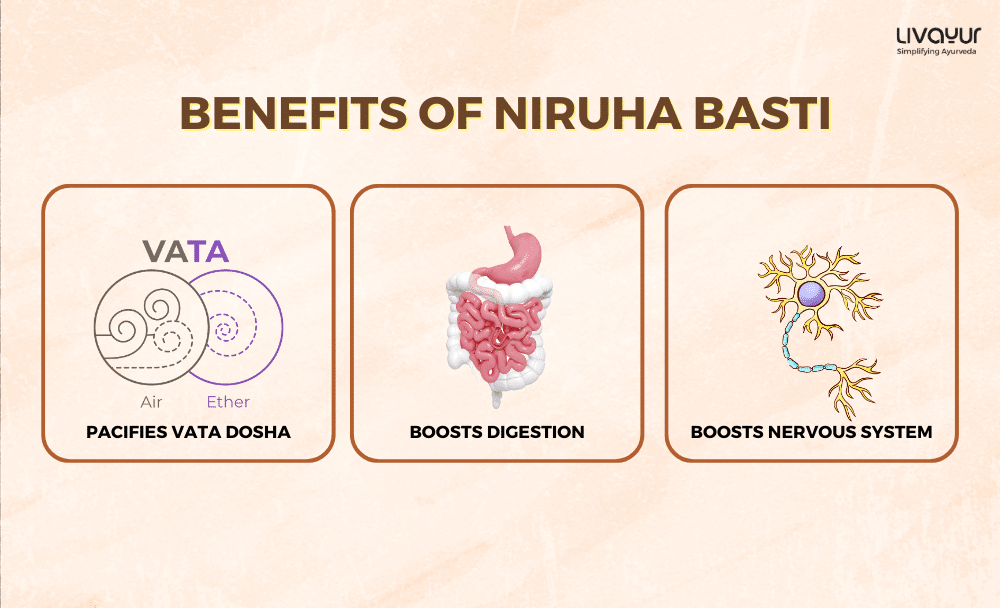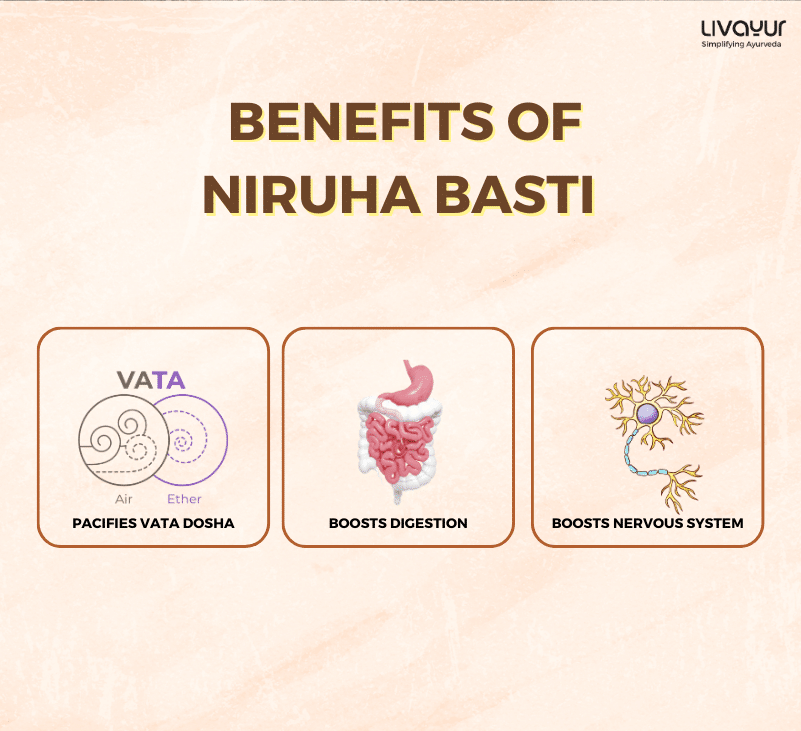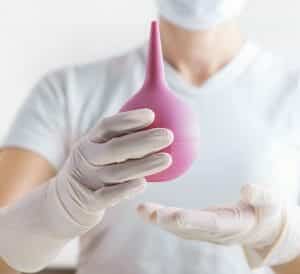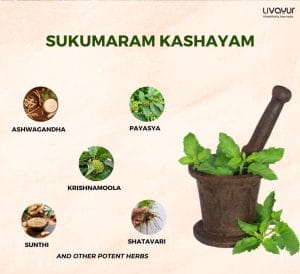
Niruha Basti is one of the therapeutic remedies in traditional Ayurvedic therapies. Rooted in the ancient wisdom of Ayurveda, Niruha Basti, or medicated enema, is a distinctive practice that addresses various health concerns. This article provides a comprehensive understanding of Niruha Basti therapy. We will also focus on its application and the diverse benefits it offers.
Niruha Basti: All You Need To Know
Before understanding Niruha Basti, it is crucial to understand Panchakarma therapy.
Panchakarma therapy is a set of five therapies, namely Vamana, Virechana, Basti, Nasya, and Raktamokshana, that help detoxify and rejuvenate the body. Out of these five therapies, Basti is considered to be the most effective.
It is an enema therapy in which herbal oils or decoctions are administered inside the body to pacify Vata Dosha and treat Vata disorders. There are two main types of basti, namely Niruha Basti therapy and Anuvasana Basti.
In Niruha Basti, also known as Kashya Basti, herbal decoctions or Kashya are administered to remove toxins from the body. It is different from Anuvasana Basti since, in Niruha Basti therapy, herbal decoctions are used instead of medicated oils.
Quick Insights About Niruha Basti
- Unlike simple purgative measures, Niruha Basti procedure infuses specially formulated, medicated substances.
- The Niruha Basti ingredients are carefully selected to balance the body’s doshas—Vata, Pitta, and Kapha.
- The blend of Niruha Basti ingredients addresses physical ailments and enhances the doshas that govern our well-being.
How Does Niruha Basti Work?
In Niruha Basti, medicated decoctions are prepared after an analysis of the Dosha imbalance and the diseases or body conditions of the patient. Although the herbs used in Niruha Basti procedure will depend on the patient, the common constituents are honey, rock salt, ghee, and Ayurvedic herbs. The dosage of the Kashya depends on many factors like age, the severity of the disease, etc.
The herbal decoction, once prepared, is administered through the urethral, anal, or vaginal route. It is best administered on an empty stomach when Vata is more predominant. After being absorbed by the large intestine, the herbal decoction prompts the colon to eliminate the toxins and Vata-related impurities from the body.
What are the Benefits of Niruha Basti?
1. Pacifies Vata Dosha
Although Niruha Basti procedure can help to expel all the vitiated Doshas, it is most effective in pacifying the aggravated Vata Dosha in the body. According to Ayurveda, Vata is the king of Doshas, and a majority of diseases are caused due to Vata imbalance. Therefore, balancing Vata is extremely important to stay healthy.
2. Detoxifies the Body
Niruha Basti therapy is a cleansing therapy that helps to remove harmful toxins from the body. The colon plays a central role in the detoxification of the body. Niruha Basti procedure prompts the colon to remove toxins through urination and bowel movements.
Want to explore more about detox? Read our related article on – How You Naturally Detox Your Body
3. Treats Half of the Diseases
Basti aids in the treatment of a majority of diseases as it helps to expel the aggravated Doshas from the body and provide nourishment to the tissues. Therefore, Ayurveda mentions Basti as Ardhachikitsa. It means that it is effective in treating half of all the diseases in the body.
4. Boosts Digestion
Niruha Basti therapy can help the colon to remove waste products from the body. It helps to improve constipation and stimulate the digestive tract, thereby improving digestion. By cleaning the colon, Niruha Basti procedure also aids in better absorption of nutrients in the body.
5. Improves Metabolism
By cleansing the intestines, Niruha Basti helps to reduce bloating and improve metabolic activities in the body.
6. Boost Nervous System
Niruha Basti procedure helps regulate serotonin levels and stimulate the nervous system. Therefore, it helps to boost various neurological and psychological activities.
What are the Therapeutic Uses of Niruha Basti?
Niruha Basti procedure helps eliminate excess Vata from the body and is mostly used to treat Vata disorders. Some conditions in which Niruha Basti can be proven highly beneficial are listed below:
- Stress, chronic fatigue, depression and insomnia
Learn how you can overcome depression with these effective strategies and tips - Menstrual disorders, PMS symptoms, endometriosis and infertility
- Neuro-muscular disorders
- Osteoporosis, rheumatism, gout, arthritis, etc.
- Lower back pain, sciatica, headache, earache, knee pain, etc.
- Facial paralysis
- Chronic constipation and hemorrhoids
- Kidney stones
- Skin conditions such as eczema and psoriasis
When To Give Niruha Basti In Panchakarma
Panchakarma therapy is a set of ayurvedic therapies that help detoxify and rejuvenate the body. Niruha Basti procedure in Panchakarma is one such therapy. Ayurveda recommends carrying the treatment of Niruha Basti on a pre-fixed auspicious date aligned with the star constellation of the patient’s horoscope or fixed on an auspicious day as per the Hindu calendar in case the horoscope is not available. Ayurveda recommends that Niruha Basti therapy should not be performed on a cloudy day.
Contradictions of Niruha Basti
Niruha Basti therapy should not be done in the following conditions:
- If the patient is suffering from indigestion
- Immediately after emesis or purgation
- If the patient is suffering from a severe cough
- In the condition of intestinal obstruction
- If the patient suffers from anorexia
FAQs
1. What is niruha basti in Ayurveda?
Niruha Basti is a type of Ayurvedic Basti widely used by practitioners. A Niruha Basti therapy can expel Dosha from the body, treat diseases, rejuvenate the body, and promote longevity. [1]
2. What is the content of Niruha Basti?
The Niruha Basti ingredients may vary. However, it typically includes ingredients like Madhu (honey), Saindhav (salt), Sneha (oleaginous substance), Kalka (herbal paste), Kwatha (decoction), Mamsarasa (meat soup), Ksheer (milk), and Kanji (rice gruel). [1]
3. Why is Niruha given on an empty stomach?
Niruha Basti therapy is typically administered on an empty stomach to allow for better absorption and effectiveness of the therapeutic substances. When the stomach is empty, the body can more readily assimilate the herbal preparations and get the best benefits of Niruha Basti. [1]
4. What are the Niruha Basti side effects?
The procedure of formulation, if not followed properly, can result in complications. Proper administration and preparation are essential to minimize the risk of side effects or complications associated with Niruha Basti. [1]
Takeaway
Niruha Basti is part of a Panchakarma therapy that helps to eliminate vitiated Vata from the body through an enema. It helps the colon remove toxins from the body and treat many diseases like chronic fatigue, rheumatism, osteoporosis, chronic constipation, etc. According to Ayurveda, Niruha Basti therapy can promote longevity and youthfulness in the patient.


















3 Comments